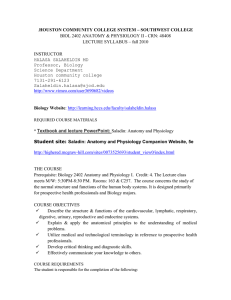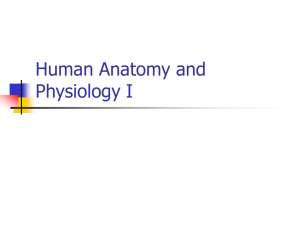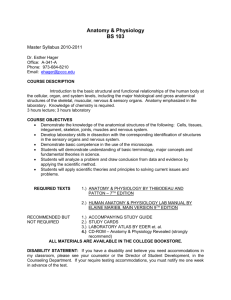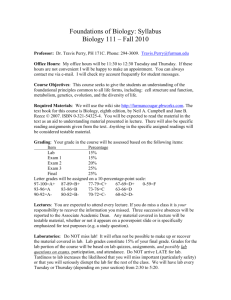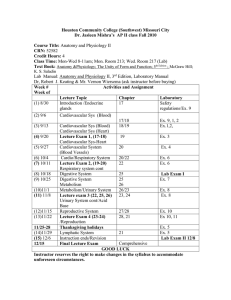bio 2402 ALIF.doc
advertisement
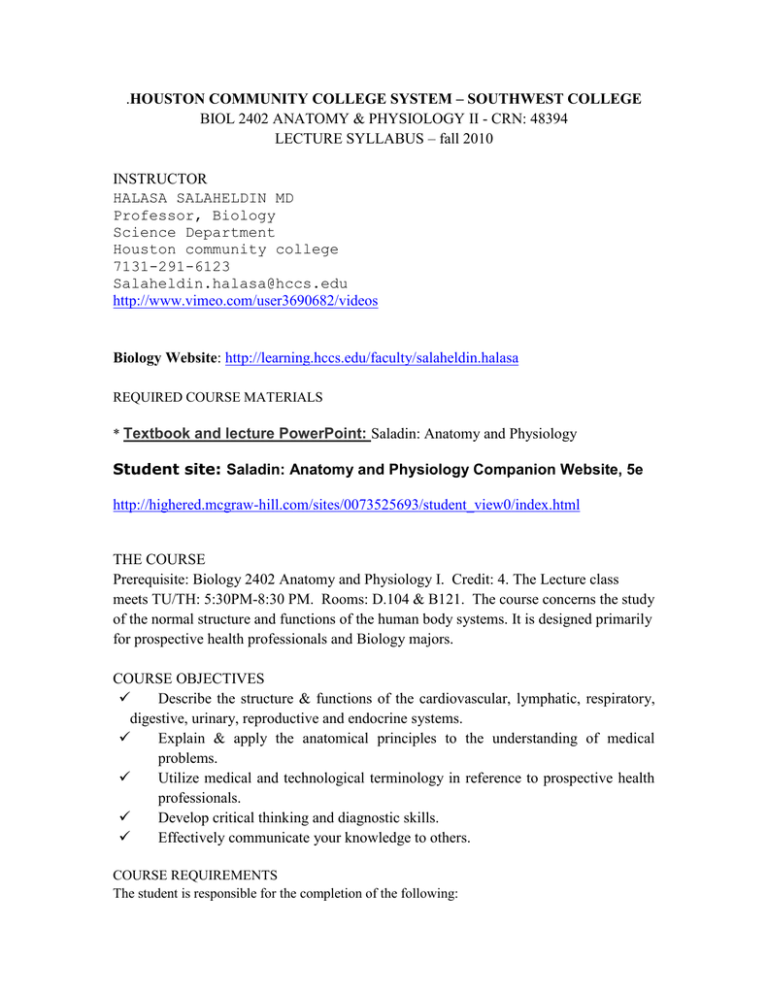
.HOUSTON COMMUNITY COLLEGE SYSTEM – SOUTHWEST COLLEGE BIOL 2402 ANATOMY & PHYSIOLOGY II - CRN: 48394 LECTURE SYLLABUS – fall 2010 INSTRUCTOR HALASA SALAHELDIN MD Professor, Biology Science Department Houston community college 7131-291-6123 Salaheldin.halasa@hccs.edu http://www.vimeo.com/user3690682/videos Biology Website: http://learning.hccs.edu/faculty/salaheldin.halasa REQUIRED COURSE MATERIALS * Textbook and lecture PowerPoint: Saladin: Anatomy and Physiology Student site: Saladin: Anatomy and Physiology Companion Website, 5e http://highered.mcgraw-hill.com/sites/0073525693/student_view0/index.html THE COURSE Prerequisite: Biology 2402 Anatomy and Physiology I. Credit: 4. The Lecture class meets TU/TH: 5:30PM-8:30 PM. Rooms: D.104 & B121. The course concerns the study of the normal structure and functions of the human body systems. It is designed primarily for prospective health professionals and Biology majors. COURSE OBJECTIVES Describe the structure & functions of the cardiovascular, lymphatic, respiratory, digestive, urinary, reproductive and endocrine systems. Explain & apply the anatomical principles to the understanding of medical problems. Utilize medical and technological terminology in reference to prospective health professionals. Develop critical thinking and diagnostic skills. Effectively communicate your knowledge to others. COURSE REQUIREMENTS The student is responsible for the completion of the following: Textbook reading assignments, homework and quizzes. Lecture exams Laboratory exercises and exams. ATTENDANCE 1. Regular attendance is required; more than four class absences may result in an automatic withdrawal of the student. Students are expected to be in attendance for the entirety of the scheduled class, including lab and lecture portions. All absences no matter for what reason, from the first day of class count toward this limit. Any absence above this limit will result in a “F’ grade for the course. 2. Habitual tardiness will not be tolerated. 3. The instructor will not withdraw students on the grade sheet or in any way after the withdrawal date. COURSE POLICIES 1. It is required that the student read the corresponding chapter stated in the syllabus prior each class. It will help you understand the subject, enhance your critical thinking and generate a higher academic performance. 2. There will be no make ups for lecture, laboratory exams and/or quizzes during the semester. 3. Appropriate clothing must be worn to class and/or laboratories. 4. No cell phones are allowed to be turned on during lecture or laboratory classes. 5. Use of recording devices, including camera, phones and tape recorders, is prohibited in classrooms, laboratories, faculty offices and other locations where instruction, tutoring, or testing occurs. Students with disabilities who need to use a recording device as a reasonable accommodation should contact the office for students with disabilities for information regarding reasonable accommodation 6. Being on time to class is extremely important. If a student exhibits chronic tardiness, the student might suffer grade penalties. Students are responsible for conducting themselves with honor and integrity in fulfilling course requirements. Disciplinary proceedings may be initiated by the college system against a student accused of scholastic dishonesty. Penalties can include a grade of "0" or "F" on the particular assignment, failure in the course, academic probation, or even dismissal from the college. Scholastic dishonesty includes, but is not limited to, cheating on a test, plagiarism, and collusion. STUDENTS WITH DISABILITIES HCCS is committed to compliance with the American with Disabilities Act and the Rehabilitation Act of 1973 (section 504). If you have any special needs or disabilities which may affect your ability to succeed in college classes or participate in college programs/activities, please contact the office of disability support services at the college. Upon consultation and documentation, you will be provided with reasonable accommodations and/or modifications. Please contact the DSS office as soon as you begin the term. HCC-Southwest: Dr HALASA SALAHELDIN MD 7131-291-6123 STUDENT DISCIPLINE Adult behavior is expected. Disruptive/activities which interfere with teaching and/or learning will be not tolerated, and may result in an administrative withdrawal without refund. ACTIVITIES AND GRADING Exams: there will be 2 lecture exam, 2 lab exam, comprehensive final lab lecture exam and exit department Exam consist of multiple choice questions. The final exam is scheduled on 15 week. You are required to take the exam at that time. If the student has either four scheduled exams on the same day, a serious personal illness, or has experienced the death of an immediate family member, the student may be granted a change in the final exam day. Daily Work: During the semester, cases studies, homework assignments and quizzes will be given. Laboratory: The laboratory will include weekly demonstrations, 3 lab exams that will illustrate and reinforce material discussed during lecture meetings. The laboratory period meets three hours per week, but likely the student will need to spend additional time in the laboratory. Tentative Schedule for lecture and laboratory exercises Lecture topic Lab topic Week: 1 2 3 4 5 6 7 8 9 10 11 12 13 14 15 TU-5:30PM-8:30 PM. TH-5:30PM-8:30 PM. Endocrine system blood heart Blood vessel Review Immune system/Lab exam 1 Respiratory system Urinary system Water /electrolytes Review Digestive system/ lab exam 2 Nutrition and metabolism female reproductive system Human development Lecture/Lab final Endocrine system blood heart Blood vessel Exam lecture 1 Immune system Respiratory system Urinary system Water /electrolytes Exam lecture 2 Digestive system Nutrition and metabolism Male reproductive system Review /Presentation Exit Exam Grading Exam lab/lecture 1: 20%, Exam: lab/lecture 2: 20% Exam: lecture/Lab final: 40% comprehensive Exit exam: 20% is comprehensive (MCQ) 90-100% A, 80-89% B, 70-79%C, 60-69%D, 0-59%F Bonus: 5% regular attendance to the class, 10 % Project: clinical case presentation including the etiology, epidemiology, pathogenesis, sign, symptoms and management or Building a body on skeleton model (http://www.anatomyinclay.com/)
